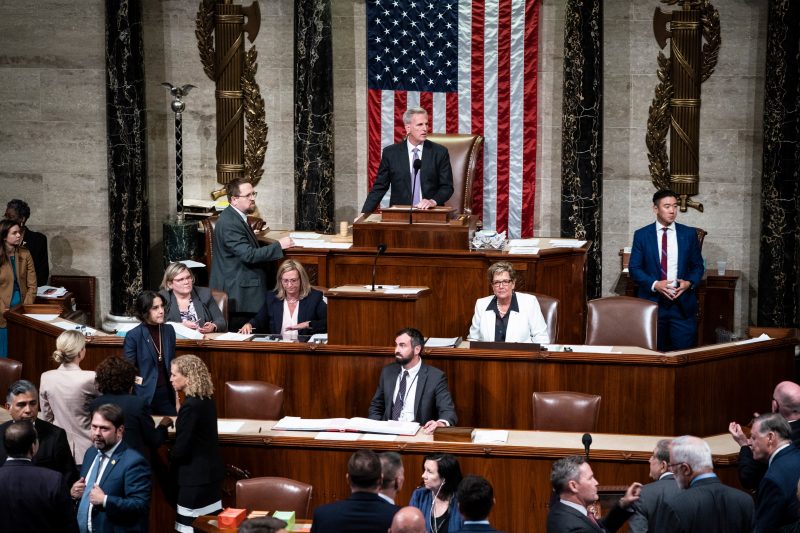House Republicans passed their border security proposal Thursday, a herculean achievement after the bill faced myriad objections from lawmakers over the past several months. The bill was passed along party lines, with only two Republicans joining all Democrats in voting against it.
The 213-page bill packages proposals approved by the Judiciary, Homeland and Foreign Affairs committees that underwent significant changes to appease several blocs of the conservative conference, most notably Hispanic Republicans representing border towns and lawmakers representing Hispanic-majority districts. It had been unclear even hours ago whether Republicans had the votes to pass the legislation as several factions, particularly the conservative House Freedom Caucus, expressed objections to certain policies.
House Republicans timed the bill’s passage to coincide with the rollback of a Trump-era policy that allowed U.S. Customs and Border Protection to use the coronavirus pandemic public health emergency as the basis to quickly deport undocumented migrants trying to enter the United States through the southern border. The Title 42 policy, as it is often known, ends Thursday night, and agents are preparing for an influx of migrants following weeks of an unprecedented surge that has already strained Border Patrol stations and holding facilities.
What happens after the Title 42 policy ends?
1/3
End of carousel
The “Secure the Border Act” would, among other provisions, provide funding to restart the building of a border wall and enhance monitoring technology along the United States’ southern and northern borders, allot millions of dollars to increase the number of Border Patrol agents, and institute changes Republicans say will streamline the asylum process. The proposal is dead on arrival in the Senate, but bipartisan groups in both chambers consider its passage a green light to jump-start an earnest attempt to address a broader, possibly bipartisan, immigration proposal this Congress.
“What we offer today through this rule is legislation that will strengthen our southern border, secure this country, protect Americans, protect migrants,” Rep. Chip Roy (R-Tex.) said Wednesday during a procedural step on the House floor to move the bill forward. “It’s pretty straightforward.”
The Biden administration has remained adamant that the border is under control, with Homeland Security Secretary Alejandro Mayorkas stressing in a Wednesday news conference that officials are prepared to aid local law enforcement in handling the expected migrant surge. His comments came after the administration announced it would send 1,500 troops to the U.S.-Mexico border to help agents ahead of Thursday.
The administration has also struck a deal with the Mexican government that would allow the United States to deport thousands of non-Mexican migrants to Mexico each month, as long as the Biden administration accepts a similar number of migrants through new legal pathways. The U.S. government also is planning to establish more migrant processing centers in Latin America and increase penalties for migrants who cross the border illegally. A new rule expected to take effect soon would also make it easier to deport asylum seekers who do not apply for the protection in another country on their way to the United States.
The White House has condemned the GOP legislation as a plan that would make “elements of our immigration system worse” and pledged President Biden would veto it if it makes it to his desk.
While the bill will not become law, House Republicans hope their united front serves as a symbolic rebuke of the Biden administration’s policies, while also fulfilling a major midterm campaign pledge that lawmakers across the ideological spectrum made to address the border.
The significance of delivering on that pledge was enough to persuade several lawmakers, who had deep concerns over several provisions, to vote in support of the measure, according to a dozen lawmakers and aides who spoke on the condition of anonymity to discuss internal deliberations. Those lawmakers felt okay supporting the legislation because it won’t become law, meaning the provisions they oppose won’t come to fruition.
“The border security part is the easiest thing we could have done, and even then we got it wrong,” said Rep. Tony Gonzales (R-Tex.), who voted in support of the bill Thursday even though a key provision of his was “watered down” to strike a deal Wednesday.
While several lawmakers were able to get their concerns addressed, one sticking point remained until the final hours over adjusted rules related to the enforcement of E-Verify, a federal system that checks job applicants’ eligibility to work. Critics, including the largest lobbying group for farmers, have argued the bill would severely hamper an already constrained labor force in rural communities. The U.S. Department of Agriculture has found that “roughly half” of farmworkers are undocumented.
Reps. David G. Valadao (R-Calif.), Dan Newhouse (R-Wash.), John S. Duarte (R-Calif.), Cliff Bentz (R-Ore.), Thomas Massie (R-Ky.) and several others indicated concerns after the bills were approved by the committees. Many, except for Duarte and Massie, were appeased after leaders moved to amend the legislation to better protect the agriculture workforce, but the provision faced opposition from House Freedom Caucus lawmakers. That prompted an 11th-hour negotiation among leaders and committee chairs as concerned lawmakers threatened to sink a procedural vote Wednesday if their changes were not addressed.
“After many discussions with House leadership, they have committed to addressing the agricultural workforce and E-Verify programs concerns I raised should a final border security bill be sent to the President,” Newhouse wrote in a statement after those talks, confirming he would support the bill.
Rep. Dan Crenshaw (R-Tex.) and several other conservatives also raised concerns over labeling cartels as terrorist groups because of a belief it would create more credible asylum claims for migrants. Revoking that provision, however, would have gone against a promise leaders already made to scores of lawmakers who wanted that rule incorporated.
After a three-hour meeting Wednesday with Speaker Kevin McCarthy (R-Calif.) and Majority Whip Tom Emmer (R-Minn.), members of the Freedom Caucus left appeased after leaders agreed to establish a commission that would study the best ways for Congress to tackle cartels and whether to designate them terrorist organizations.
How the U.S. is trying to deter illegal border entries
1/7
End of carousel
“Washington politicians fight to water down my portion of the border security bill that labels cartels as TERRORIST — as gunfire breaks out along the Texas/Mexico border,” Gonzales tweeted in response to the changes. “[Whose] side are they on?”
Democrats have shunned the bill as unnecessarily cruel toward asylum seekers and stressed that the recent Republican debt ceiling proposal would slash funds for the Department of Homeland Security, increasing the threat of an unmanageable border. Minority Leader Hakeem Jeffries (D-N.Y.) scorned the bill Thursday, claiming “extreme MAGA Republicans” are continuing to “create a fictional argument around what’s happening at the border and then actually do nothing to solve the real problem.”
Some have also attacked the legislation as doing little to address racism and violence against Hispanic migrants, a broader problem Democrats have alleged motivated a man to slam his SUV into a crowd of migrants in Brownsville, Tex., over the weekend, killing eight people and injuring 10. Brownsville police have not released a motive, though officials said Monday they have not ruled out that it may have been an intentional act.
“This bill is quite simply a way, for some, to score political points … by demonizing immigrants,” said Rep. Jim McGovern (Mass.), the top Democrat on the House Rules Committee. “Language has consequences.”
The House GOP bill’s passage almost did not happen. House Majority Leader Steve Scalise (R-La.) promised to put a proposal written by Roy on the floor during the first two weeks of January, but the raucous exercise to elect McCarthy speaker exposed the difficulty of passing legislation through a four-vote majority.
Leadership still planned to bring the bill to the floor earlier this year — bypassing regular order, which holdouts to McCarthy’s speakership had demanded — but it faced stark opposition from moderate Republicans and Hispanic Republicans who argued the three-page bill would effectively shut down the border, including blocking migrants from seeking asylum, if any port of entry is overwhelmed.
Hispanic Republicans and moderates privately argued that they would be against any legislation that bars legal immigration. Gonzales, who represents about 40 percent of the Texas border with Mexico, promised to kill the bill’s chances or vote against other must-pass bills if the legislation moved forward. That forced leaders to introduce Roy’s bill in the Judiciary Committee instead of Homeland, where Gonzales and other Hispanic Republicans sit.
While Gonzales choose to publicly blast Roy’s bill to protect vulnerable Republican incumbents who could not do the same, others remained in private negotiations with Scalise and the chairs of the three committees of jurisdiction. Provisions within the Judiciary Committee’s proposal irked scores of lawmakers, and as many as a dozen threatened to sink the bill at multiple points, causing leadership to twice delay consideration of their bill in the committee.
“They were going to lose enough Republican votes it was going to sink. And some of the members that had the biggest concerns have been actively involved in the committee process and think that the changes have been impactful enough that they now are supportive of it,” said Rep. Don Bacon (R-Neb.), who initially had concerns. “So this had the impact that I wanted.”
Roy’s bill was ultimately modified during committee debate late last month, and language was added that would instead require asylum seekers to remain in Mexico until their court date in the United States or until the port of entry was deemed under operational control by the homeland security secretary. Other concerns, such as how undocumented minors would be treated at the border and reunited with their family, were also addressed in a way that appeased Hispanic Republicans who represent border districts.
“That was very important to me — to make sure that we were not only vetting the sponsors before the children are turned over but also to have wellness checks and be able to have some accountability on where they’re going and be able to track that,” freshman Rep. Juan Ciscomani (R-Ariz.) said, noting reports that the government has lost track of hundreds of undocumented minors.
Yet opposition remains from outside groups who have lobbied Republican lawmakers to oppose the bill. Catholic Charities USA sent a letter to McCarthy and Jeffries on Monday urging the House to sink the bill, arguing it would restrict asylum, lead to more children being detained and limit how much federal help nonprofit groups, such as religious organizations, get if they help migrants.
“The gospel calls us to provide shelter for those who are homeless, feed the hungry, and ‘welcome the stranger,’” wrote Sister Donna Markham, president and CEO of Catholic Charities USA. “… While we do not oppose all the provisions in H.R. 2, several of them, if enacted, would severely hinder the government and nongovernmental organizations (NGOs) from aiding migrants who need services, care, and assistance.”
A previous version of this article incorrectly stated the name of the president and CEO of Catholic Charities USA as Sister Donna Markus. Her name is Sister Donna Markham. The article has been updated.
Theodoric Meyer, Maria Sacchetti and Michelle Boorstein contributed to this report.








